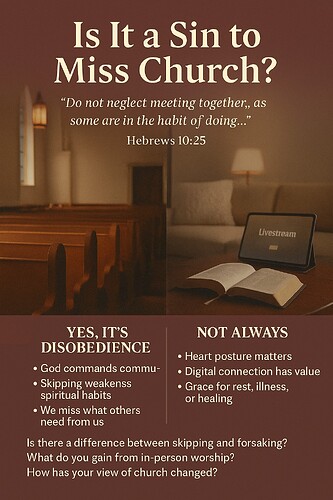Yes, there is a difference between skipping and forsaking church, but let’s not soften what Scripture demands. Hebrews 10:25 doesn’t merely give a friendly nudge — it issues a warning in the context of apostasy. The Greek verb ἐγκαταλείπω (“to abandon, to desert, to forsake”) is used elsewhere for deep betrayal, such as Jesus’ cry on the cross (Mark 15:34). The writer is addressing believers tempted to withdraw from the body under pressure, isolation, or apathy, and he ties that withdrawal to drifting away from the faith itself (Hebrews 10:26–27).
So yes, occasional absence isn’t the same as hardened abandonment. But repeated neglect, even for reasons that feel justifiable, can dull the soul and erode obedience. Christianity isn’t a solo project. The church is not a building, but it is a gathered body, and that gathering isn’t optional — it’s commanded. Jesus didn’t save individuals into private spiritual experiences; He saved a people, a flock, a household of faith who are to worship together, bear burdens together, break bread together, and stir one another to love and good works (Acts 2:42, Gal 6:2, 1 Cor 12, Heb 10:24).
Livestreams may supplement but never replace the embodied, physical fellowship of the saints. A screen cannot lay hands, cannot baptize, cannot break bread, cannot weep beside you or rejoice with you in Spirit-empowered presence. That kind of life-on-life communion is part of how God sanctifies us.
What do I gain from corporate worship? Correction, edification, accountability, shared joy, spiritual alignment, the preached Word, the ordinances, and a foretaste of heaven — where no one worships alone. If you consistently avoid the body, you are spiritually malnourished, whether you feel it or not.
So is missing church a sin? Not always. But making it a habit, minimizing its necessity, or prioritizing comfort over communion — that is where sin creeps in. And the danger isn’t just missing church. The danger is missing Christ, who walks among the lampstands — His churches (Revelation 2:1).
Ephesus – one of the seven wonders of the ancient world. Paul had visited Ephesus about a.d. 53, about 43 years before this letter in Revelation was sent to them. Paul remained in Ephesus for several years and preached the gospel so effectively “that all the Jews and Greeks who lived in the province of Asia heard the word of the Lord” (Act_19:10). This large city was thoroughly stirred by Paul’s message (Act_19:11-41), with the result that the silversmiths created a riot because their business of making shrines of Artemis was threatened. - BKC
the one who holds – This description of Jesus is taken from Rev_1:16. The term “holds” speaks of a firm, sure grasp (cf. Joh_10:28). Nothing and no one could separate these churches from Jesus (cf. Rom_8:31-39) except their own refusal to repent and follow Him!
Christ is identified as the speaker at the beginning of each of the addresses to the churches in Rev 2–3; this reflects aspects of John’s introduction in Rev_1:9-20. - Utley
the seven stars in his right hand . . The “stars” were the angels or messengers of the churches and the “lampstands” were the seven churches (Rev_1:20). - BKC
walking among . . This anthropomorphic metaphor is used in Gen_3:8 as a symbol of God’s presence with mankind (cf. Lev_26:12).
the golden lampstands . . This does not refer to the Menorah of the Tabernacle, but is another symbol for the seven churches. - Utley
J.

